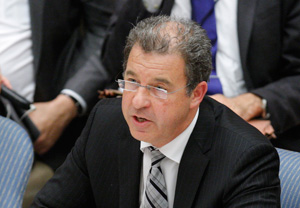Completion Strategy Report: Prosecutor Brammertz’s address before the Security Council

ICTY Prosecutor Serge Brammertz
Prosecutor Serge Brammertz presented today to the Security Council the Office of the Prosecutor's (OTP) 19th completion strategy report, addressing the progress of trials and appeals, the cooperation of countries in the former Yugoslavia and the OTP's efforts to support national war crimes strategies in the former Yugoslavia.
At the outset, the Prosecutor acknowledged that, in this reporting period which marked the 20th anniversary of the Tribunal's work “never before has so much been said and written about our cases, our legacy and our contribution to the reconciliation in the region.” The Prosecutor stated that “as a party to the proceedings, the OTP must accept the judgements issued.” Nevertheless, he said it “will continue to use all remaining legal mechanisms to press for the outcomes we think are just and that properly reflect the culpability of accused persons brought before this Tribunal”.
Speaking about the ongoing trials and appeals, the Prosecutor noted significant progress in the evidence presentation in the ICTY's last three trials: Karadžić, Mladić and Hadžić. The Karadžić trial is well into the defence evidence presentation phase and is expected to finish before the end of this year. The Prosecution is continuing to present its evidence in the Mladić and Hadžić cases and the evidence presentation in both cases will also likely conclude well before the end of this year. Speaking about the appeals proceedings, the Prosecutor noted that four cases with 11 accused have been added to the Appeals Division's case load. The Prosecutor stressed that the OTP's work on the remaining trials and appeals had been helped by good cooperation from Croatia, Serbia and Bosnia and Herzegovina.
Turning to national war crimes strategies, Prosecutor Brammertz pointed to a number of remaining problems, particularly in Bosnia and Herzegovina. He emphasized the need for concrete and urgent action. In this regard, the Prosecutor will travel to Sarajevo in late June for in-depth discussions on the status of the remaining nine Category II cases transferred to Bosnia and Herzegovina by the OTP. In addition, the OTP will hold a practical information session in Sarajevo for entity level prosecutors about accessing material from the OTP databases. The Prosecutor also mentioned additional initiatives undertaken by the OTP to improve regional capacity for war crimes cases, including a training proposal, strategies to transfer expertise on sexual violence prosecutions from the ICTY to the region and the joint ICTY/EU liaison prosecutor and young professionals programme.
As regards regional co-operation, the Prosecutor pointed to signs of progress with the conclusion of two regional co-operation protocols for the prosecution of war crimes, one between Serbia and Bosnia and Herzegovina and the other between Croatia and Bosnia and Herzegovina.
Prosecutor Brammertz also highlighted two issues concerning regional commitment to the rule of law: Serbia's ongoing efforts to establish accountability for those who assisted ICTY fugitives to evade justice and the need for regional authorities to urgently re-focus on investigating the location of missing persons, regardless of their ethnicity.
The Prosecutor concluded by stating that “the thousands who survived crimes committed during the conflicts in the former Yugoslavia should be foremost in our minds. For them the passage of 20 years has little meaning. The crimes they lived through, and the crimes that took away their loved ones, are ever present and we must redouble our efforts to facilitate redress for them.”

